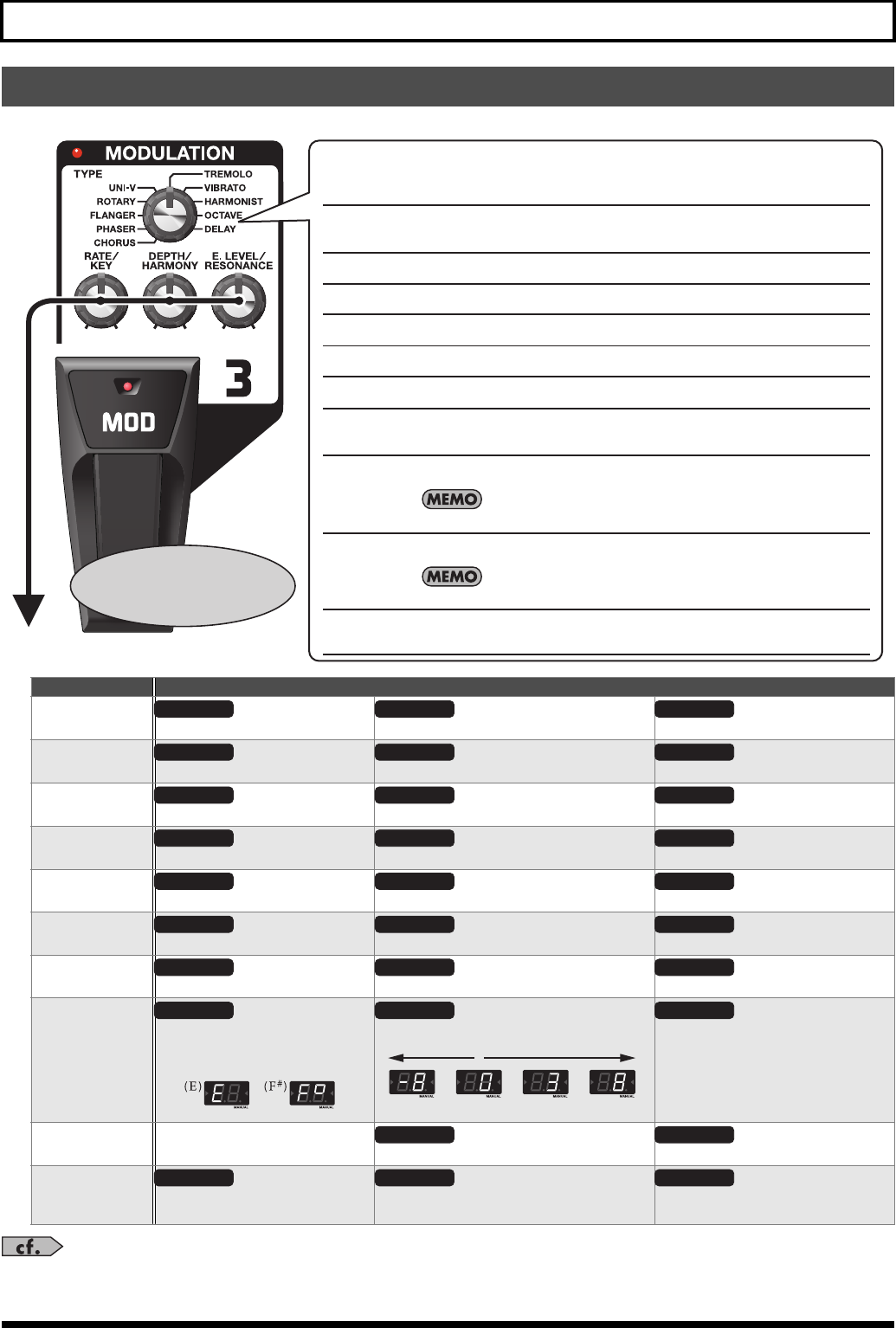
E-6
Using the Effects
These effects broaden, modulate, and/or pitch shift the sound.
fig.0140
You can control the RATE parameter using the expression pedal. For more information, read “Using Pedal FX” (p. E-9).
MODULATION
TYPE What the controls do
CHORUS
This sets the speed of the effect. This sets the richness of the effect. This sets the volume level of the effect.
PHASER
This sets the speed of the effect. This sets the richness of the effect. This sets the intensity of the effect.
FLANGER
This sets the speed of the effect. This sets the richness of the effect. This sets the intensity of the effect.
ROTARY
This sets the speed of the effect. This sets the richness of the effect. This sets the volume level of the effect.
UNI-V
This sets the speed of the effect. This sets the richness of the effect. This sets the volume level of the effect.
TREMOLO
This sets the speed of the effect. This sets the richness of the effect. This sets the volume level of the effect.
VIBRATO
This sets the speed of the effect. This sets the richness of the effect. This sets the volume level of the effect.
HARMONIST
This sets the musical key of the song
being played.
This sets the pitch of the harmony. This sets the volume level of the effect.
OCTAVE
—
This sets the volume level of the direct sound. This sets the volume level of the effect.
DELAY
This sets the delay time (10 to 990
ms), in steps of 10 ms.
This set the number of repetitions for the delay. This sets the volume level of the effect.
MOD Pedal
This switches the eect
on and o.
TYPE knob
Use this to choose the type of modulation.
This eect adds subtle wavering to transform the tone into one that is
broader, thicker, and more beautiful.
This eect creates a sweeping, phase-shifted sound.
This creates a modulation eect like the rising and falling sound of a jet engine.
This eect produces the sound of rotating speakers.
This models the Uni-Vibe, an eect that's part of the rock sound of the 1960s.
This produces a retro eect through cyclical changes in the volume level.
This produces an intense vibrato eect unobtainable with normal guitar
playing.
This creates harmonies reminiscent of twin guitars.
Play only single notes when using the harmonist eect.
This imparts thickness by adding sound an octave lower.
Play only single notes when using the octave eect.
This delays the sound to produce an echo-like eect. At delay times of
100 to 990 ms (milliseconds), you can use it as a secondary delay.
1: CHORUS
2: PHASER
3: FLANGER
4: ROTARY
5: UNI-V
6: TREMOLO
7: VIBRATO
8: HARMONIST
9: OCTAVE
10: DELAY
RATE DEPTH E. LEVEL
RATE DEPTH
RESONANCE
RATE DEPTH
RESONANCE
RATE DEPTH E. LEVEL
RATE
DEPTH
E. LEVEL
RATE DEPTH E. LEVEL
RATE DEPTH E. LEVEL
KEY
Ex.
HARMONY
Detune +1 Octave3rd-1 Octave
E. LEVEL
D. LEVEL
E. LEVEL
TIME
FEEDBACK
E. LEVEL
ME-70_e1.book 6 ページ 2008年11月5日 水曜日 午後5時39分


















